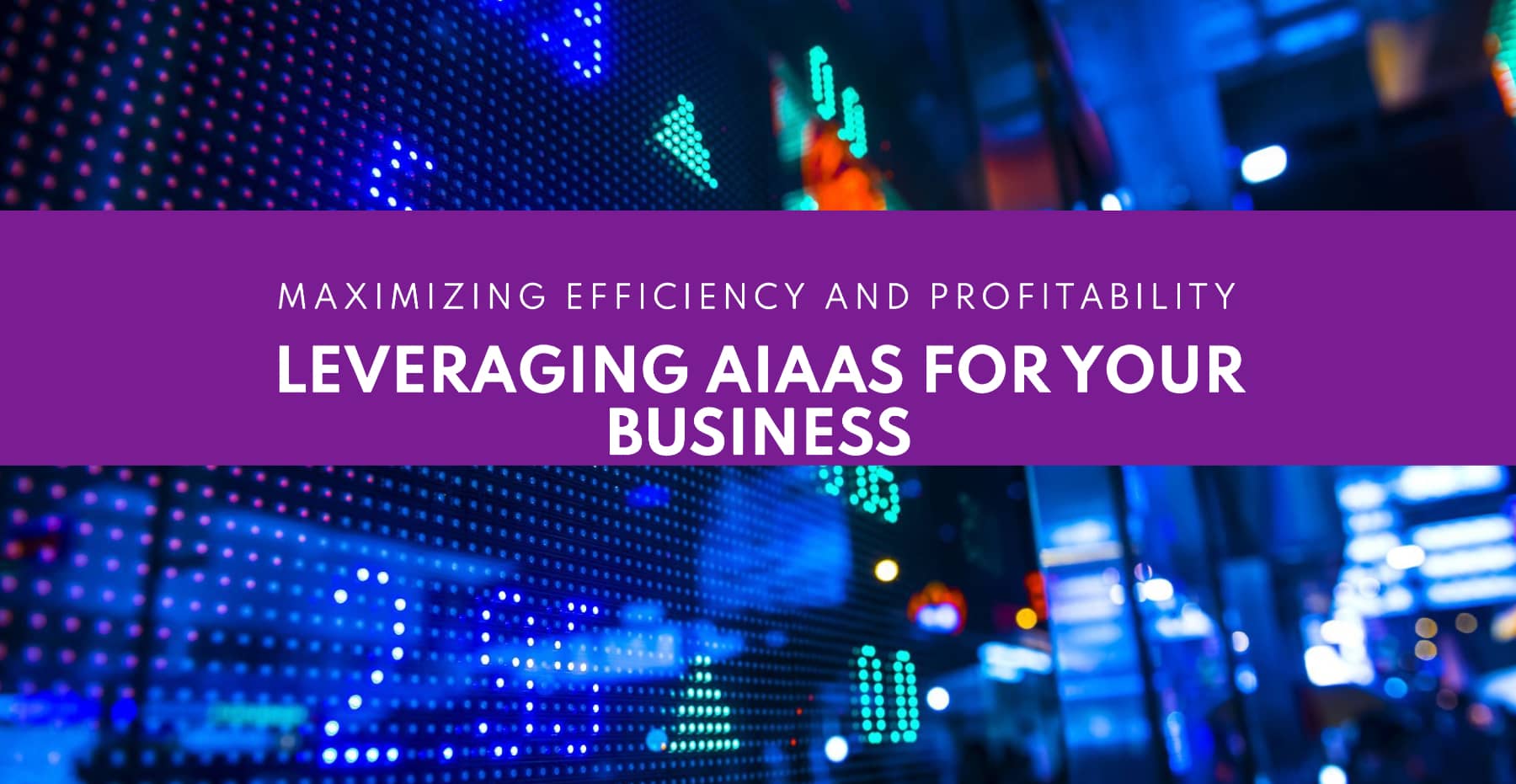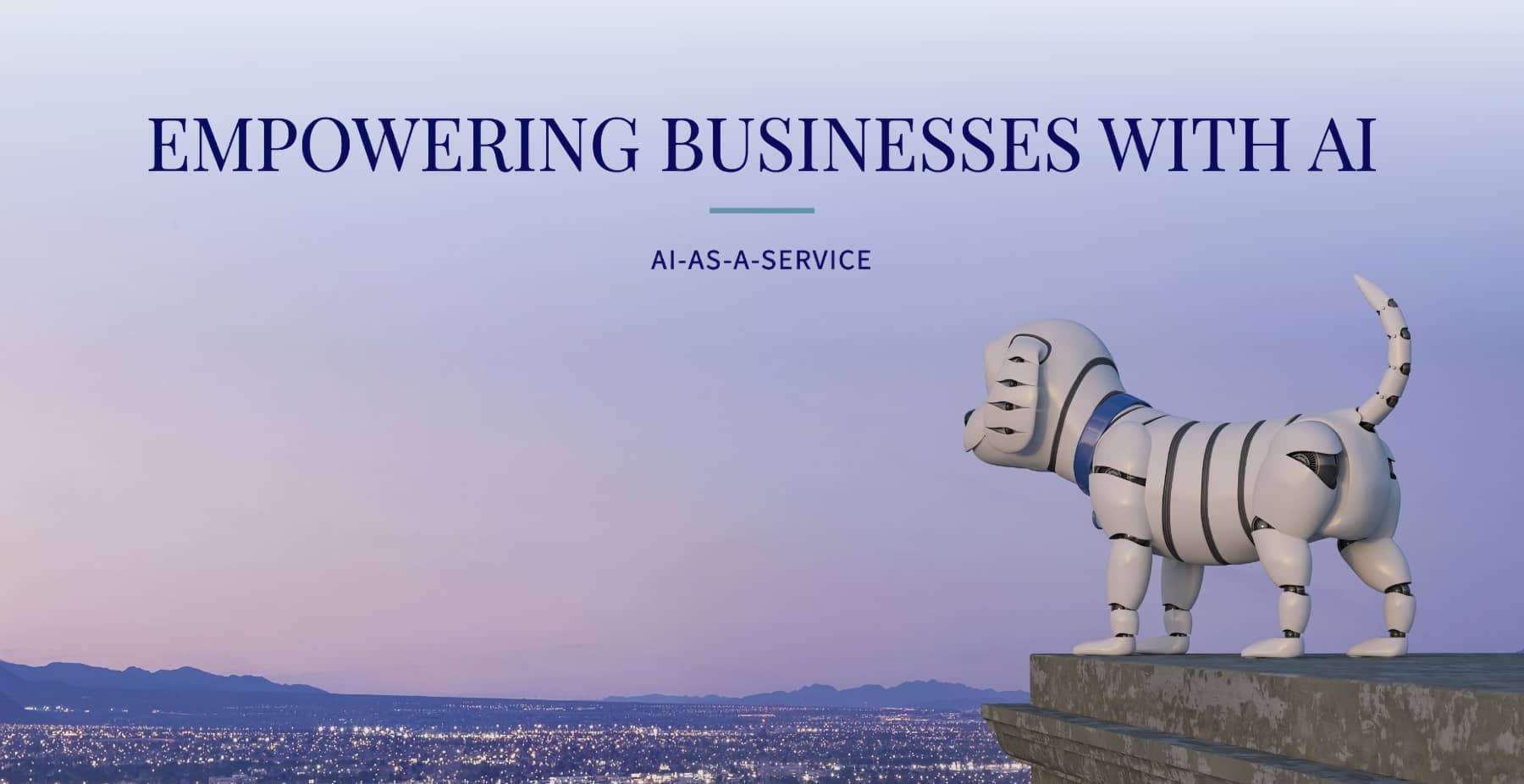Artificial intelligence (AI) is transforming businesses across industries by automating processes, gaining insights from data, and enhancing decision-making. However, developing custom AI solutions requires substantial investments in infrastructure, talent, and resources. This is where AI-as-a-Service (AIaaS) comes in making enterprise-grade AI accessible for organizations of all sizes.
What is AI as a Service?
AIaaS refers to cloud-based services that provide pre-built AI tools, platforms, and models to businesses on a subscription basis. By leveraging AIaaS, companies can harness the power of AI and machine learning without needing to build it from scratch.
"AI as a service allows businesses to incorporate advanced AI capabilities like predictive analytics, image recognition, and natural language processing into their workflows without significant upfront development."
Key features of AIaaS include:
Pre-trained AI models - Ready-to-use models for computer vision, NLP, customer churn prediction etc.
Automated machine learning - Auto model building and deployment pipelines.
Cloud infrastructure - Scalable cloud platform without infrastructure setup.
APIs and SDKs - Seamless integration into apps and systems.
Security - Enterprise-grade access controls and data governance.
Type | Description |
Bots and Digital Assistants | AI-powered chatbots for customer service support and marketing activities. |
API | Access specific AI capabilities like translation and image recognition via APIs. |
No-code ML Platforms | Intuitive drag-and-drop interfaces to build ML apps without coding. |
Key Benefits of AIaaS
AIaaS solutions promise several business benefits including:
Cost savings - Eliminate expensive in-house AI infrastructure and talent. Pay only for what you use.
Enhanced efficiency - Automate repetitive and mundane tasks to boost productivity.
Faster innovation - Quickly test and deploy new AI proofs of concept and applications.
Scalability on demand - Scale usage up or down based on real-time business needs.
Let's explore the world of AIaaS further and how this game-changing technology can empower businesses to achieve a competitive edge.

How Businesses Can Leverage AIaaS
Before exploring specific AIaaS solutions, it is crucial for businesses to clearly identify their needs and challenges. The business use cases will guide the selection of appropriate AI tools and models.
Exploring Business Use Cases
Various industries are leveraging AIaaS in diverse ways:
Retail - Personalized recommendations to boost sales and conversions
Healthcare - Accurate diagnosis through computer vision and predictive analytics
Finance - Fraud detection by analyzing transaction patterns
Marketing - Optimizing campaigns via sentiment analysis and NLP
Here are some examples of AIaaS powering real-world business applications:
Coca Cola utilizes Google Cloud services to optimize vending machine locations and product availability using predictive analytics. This has helped enhance the customer experience.
Starbucks leverages Azure Machine Learning to power an AI-based recommendation engine for suggestive selling across channels.
Copy.ai's Workflow feature lets teams automate multi-step content creation workflows using natural language AI models. This helps scale high-quality, personalized content production.
Integration and Implementation
To successfully adopt AIaaS, businesses should take a phased approach:
Phase 1 - Evaluate and Plan
Assess existing infrastructure, workflows, datasets, and skill gaps.
Define clear AI success metrics and KPIs.
Create an implementation roadmap aligning AI initiatives with business goals.
Phase 2 - Implement and Test
Start with a limited proof-of-concept using low-risk use cases.
Integrate AIaaS solutions with existing tools using APIs or SDKs.
Rigorously evaluate predictions and outputs before broad rollout.
Phase 3 - Scale and Optimize
Provide ample training and change management for employees.
Scale usage across applicable workflows to maximize productivity.
Continuously monitor outputs, fine-tune AI models, and measure impact.
This phased and iterative approach ensures smooth AI adoption while delivering tangible business value.
Different Types of AIaaS
There are several categories of AIaaS offerings catering to diverse business needs:
1. Bots and Digital Assistants
Chatbots and virtual assistants are popular AIaaS tools that interact using natural conversations. They typically leverage natural language processing (NLP) to understand requests and respond with relevant answers or actions.
Key capabilities offered by conversational AI tools include:
24/7 automated customer service support
Answering common queries
Generating leads via interactive chat
Personalized marketing across channels
For example, InPost automated 92% of customer conversations using an AI-powered chatbot, delivering immense scalability.
2. Application Programming Interfaces (APIs)
AIaaS providers offer developer APIs and SDKs to integrate smart functionalities into business applications. This eliminates the need for in-house AI development.
Some examples of popular AI capabilities available via APIs:
Image and video recognition
Speech to text transcription
Natural language classification
Anomaly detection in data
Predictive analytics
By integrating just a few lines of code, developers can embed powerful AI to enrich their apps.
3. Machine Learning Frameworks
Getting started with machine learning typically requires significant data science expertise. AIaaS offerings remove this barrier through managed ML services.
These platforms allow training, evaluating and deploying custom ML models using intuitive interfaces and pre-built components. This democratizes access to AI for non-technical teams.
Key ML capabilities offered in AIaaS:
Image classification models
Predictive maintenance models
Customer churn models
Sales forecasting models
Custom intent recognition models
4. No-Code and Low-Code ML
No-code AI solutions take accessibility one step further. These tools provide graphical, drag-and-drop interfaces to develop AI apps without writing any code.
Low-code options still involve some scripting, but abstract the complex parts of development using templates and automatically generated code.
Together, these enable businesses to tap into AI even without technical resources.
Key Benefits of AIaaS
Adopting AI-as-a-service solutions empowers businesses to achieve their AI aspirations without prohibitive investments. Let's examine some major benefits further:
1. Cost Savings
AIaaS eliminates the high cost of developing custom AI solutions in-house, which may require specialized data infrastructure and scarce AI talent.
It offers convenient access to advanced AI capabilities on an affordable pay-as-you-go basis. This operational expenditure model provides fantastic flexibility and cost efficiency.
For example, businesses can get started with basic text classification capabilities for less than $50 per month with select vendors.
2. Scalability and Agility
Since AIaaS leverages cloud infrastructure, it allows seamless scaling on demand. Usage can be adjusted upward or downward based on changing business workloads.
This cloud elasticity delivers immense agility to keep pace with evolving requirements. For instance, an extra burst of chatbot conversational loads during peak season can be handled without disruption.
3. Accelerated Innovation
The biggest constraint for most businesses in harnessing AI is the skill gap. AIaaS solutions bridge this by providing turnkey access to advanced ML models through simple interfaces.
This empowers teams to quickly prototype ideas and deliver AI-powered innovations in an accelerated fashion. The faster experimentation ultimately results in faster time to market with transformative solutions.
4. Focus on Core Competencies
Outsourcing the complexities of building and managing AI infrastructure to specialists allows businesses to stay laser-focused on their core competencies.
Subject matter experts can dedicate more time towards high-value tasks, leaving the heavy lifting of AI development and maintenance to the AIaaS provider.
In summary, AIaaS unlocks tremendous capabilities for businesses without complex trade-offs. It's a win-win for productivity and innovation.

Key Challenges with AIaaS
While AIaaS delivers immense value, businesses must be cognizant of certain risks and challenges:
1. Data Privacy and Security
Since AIaaS involves sharing data with third-party vendors, legitimate data privacy and security concerns arise. Though leading providers offer enterprise-grade access controls and encryption, the risk exposure is higher compared to in-house models.
Strict data governance practices must be employed in tandem with rigorous platform evaluations on factors like security certifications, compliance with regulations, and breach transparency.
2. Risk of Vendor Lock-in
If businesses become overly dependent on a single vendor's proprietary formats, algorithms or interfaces, it can lead to a lack of portability. Switching solutions down the line can become challenging in such scenarios.
The possibility of unexpected platform changes or pricing hikes also looms when relying too heavily on one vendor. Having mitigation plans through evaluating backup options is critical.
3. Data Quality Challenges
Since the output of AI models is only as good as the input data, having robust data collection, labeling and preparation practices is key.
If biases or noise creep into the training data, it gets amplified through AI algorithms leading to unreliable or misleading outputs. Maintaining high data quality and integrity is essential.
4. Interpretability Issues
Many AIaaS offerings utilize black box algorithms that lack transparency into model predictions. This interpretability gap makes it hard to diagnose unwanted biases or fix errors.
Seeking providers that enable explanation facilities and provide debugging support is advised. Relying blindly on AI outputs without deeper visibility carries risks.
While AIaaS unlocks tremendous potential, managing risks via diligence and governance is vital.
Leading AIaaS Providers
There are a multitude of AIaaS vendors offering innovative solutions for business needs:
General Providers
Vendor | Key Offerings |
Pre-trained ML models, AutoML, AI Hub | |
Cognitive services, Bot service, ML studio | |
SageMaker, Lex, Forecast, Rekognition | |
Watson Assistant, Natural Language Understanding |
Specialist Providers
These niche players provide cutting-edge capabilities:
Anthropic - Claude conversational AI model
DataRobot - Automated machine learning
Algorithmia - ML models marketplace
Observe.AI - Voice AI for customer service
Copy.ai - AI content generation
The vibrant ecosystem has an AIaaS solution for virtually every business need to unlock value from data.
AIaaS - A Catalyst for Data-Driven Innovation
Artificial Intelligence-as-a-Service opens avenues for harnessing the tremendous power of AI to drive innovation. By providing easy access to enterprise-grade AI capabilities, AIaaS allows even small teams with limited resources to experiment and implement AI-based solutions.
With pre-built models, automated ML pipelines, and flexible consumption models, AIaaS solutions eliminate many barriers to AI adoption faced by traditional approaches. They unlock AI's potential in a faster, more cost-effective and scalable way.
However, to maximize success, it is crucial to evaluate options diligently, govern data responsibly, and take a phased approach focused on use cases delivering tangible impact. With the right vision and execution, AIaaS can transform businesses into agile, data-driven engines of innovation, growth and efficiency.
The promise of AI is closer than ever with AIaaS bringing cutting-edge capabilities to the masses. It is time for forward-thinking businesses to embrace this technology and unlock sustainable competitive advantage.


